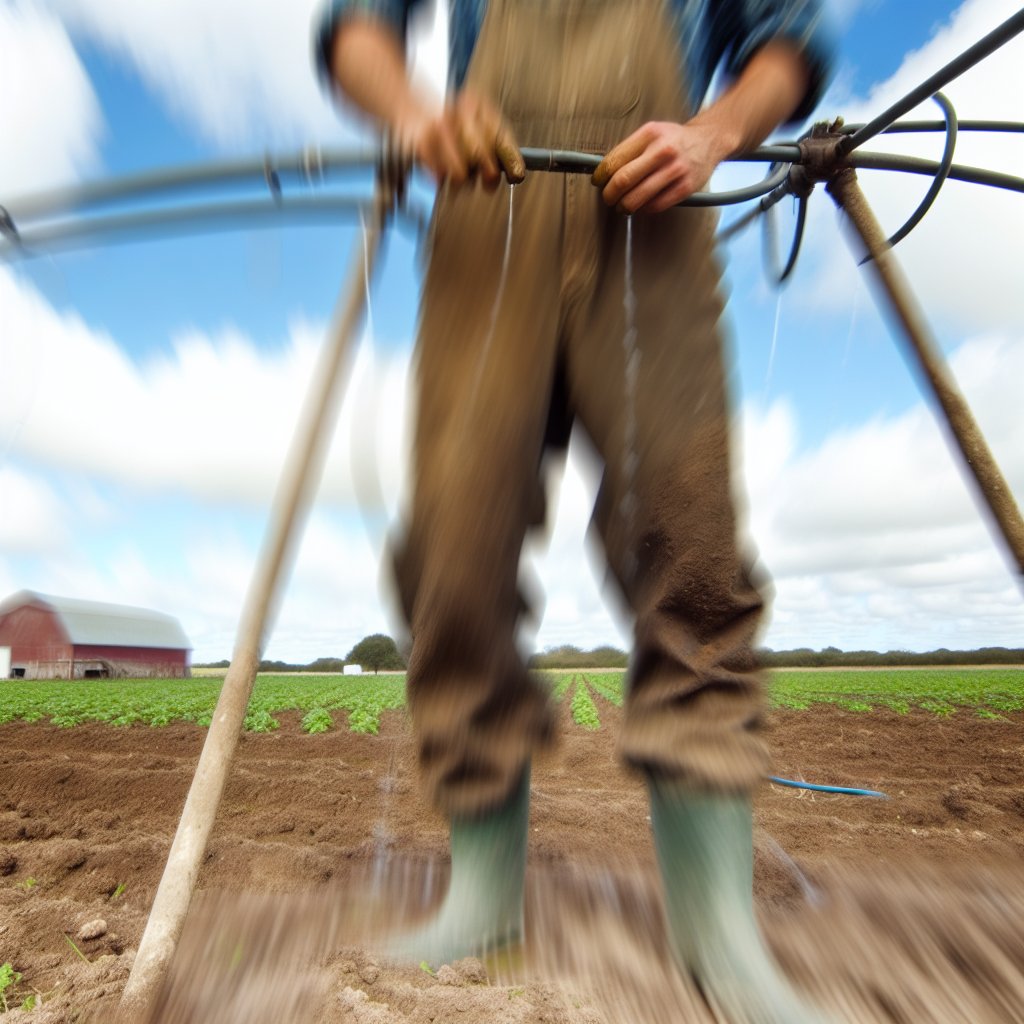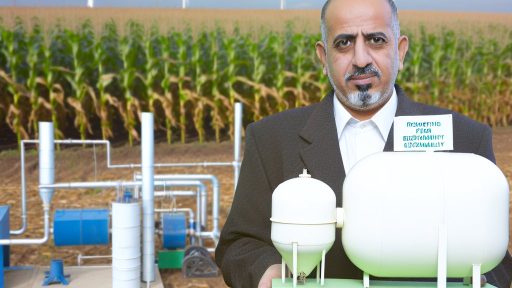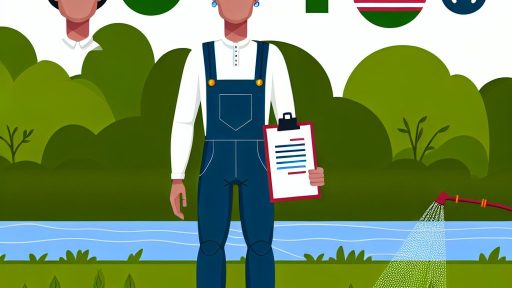Introduction to Sustainable Irrigation in Organic Farming
Sustainable irrigation practices are crucial for organic farming.
These practices ensure efficient water use while supporting crop health.
Additionally, sustainable irrigation contributes to environmental preservation.
Farmers increasingly seek methods that minimize waste.
This section explores key sustainable irrigation methods in organic agriculture.
Importance of Water Conservation
Water conservation is vital in agricultural practices today.
It helps maintain water resources for future generations.
Moreover, it reduces costs associated with water usage.
Effective water management improves crop yields significantly.
Farmers benefit from innovative irrigation techniques.
Types of Sustainable Irrigation Systems
Several sustainable irrigation systems are available to farmers.
Drip irrigation is one of the most efficient methods.
This system delivers water directly to the plant roots.
Furthermore, it minimizes evaporation and runoff.
Sprinkler systems also provide flexible irrigation options.
Transform Your Agribusiness
Unlock your farm's potential with expert advice tailored to your needs. Get actionable steps that drive real results.
Get StartedHowever, they require careful management to avoid waste.
Subsurface irrigation is another effective method for certain crops.
This technique reduces water loss and controls water levels in the soil.
Integrating Rainwater Harvesting
Rainwater harvesting can complement irrigation systems effectively.
It captures and stores rainwater for later use.
This practice reduces reliance on conventional water sources.
Farmers can use harvested rainwater during dry spells.
Moreover, rainwater is typically free of salts and chemicals.
Therefore, it is beneficial for organic farming practices.
Integrating this technique promotes resource sustainability.
Soil Health and Irrigation Efficiency
Healthy soil plays a crucial role in effective irrigation.
Organic matter in the soil improves water retention.
This reduces the frequency of irrigation needed for crops.
Furthermore, soil health influences plant resilience against drought.
Farmers should regularly test soil moisture levels.
Utilizing moisture sensors can help in precise irrigation decisions.
Appropriate irrigation schedules enhance overall water efficiency.
Overcoming Challenges in Sustainable Irrigation
Despite the benefits, challenges exist in sustainable irrigation.
Water scarcity is a growing concern in many regions.
Farmers need to adapt to changing climate conditions.
Education and technology play vital roles in overcoming these challenges.
Moreover, sharing knowledge within the farming community aids success.
Collaborative efforts can lead to innovative solutions for obstacles faced.
Importance of Water Conservation in Agriculture
Global Water Scarcity
Water scarcity impacts agricultural productivity worldwide.
Showcase Your Farming Business
Publish your professional farming services profile on our blog for a one-time fee of $200 and reach a dedicated audience of farmers and agribusiness owners.
Publish Your ProfileFarmers face increasing challenges due to diminishing freshwater resources.
As populations grow, the demand for water rises sharply.
Consequently, sustainable practices become vital in managing water usage.
Enhancing Crop Yields
Efficient water management enhances crop yields significantly.
Healthy crops thrive with adequate water supply, promoting robust growth.
Moreover, the right irrigation methods improve soil moisture retention.
This leads to higher productivity, benefitting both farmers and consumers.
Reducing Environmental Impact
Sustainable irrigation practices help reduce the environmental impact.
Additionally, they minimize the runoff of fertilizers into nearby water bodies.
Furthermore, conserving water decreases the energy required for irrigation.
This reduces greenhouse gas emissions, contributing to climate change mitigation.
Economic Benefits
Water conservation leads to substantial economic savings for farmers.
Lower water bills translate to reduced overall operational costs.
A well-managed irrigation system increases profitability over time.
Moreover, sustainable practices can open markets for organic produce.
Adaptation to Climate Change
Climate change poses significant risks to agricultural water supplies.
Farmers must adapt to unpredictable weather patterns and droughts.
Implementing water-saving technologies enhances resilience to these challenges.
Consequently, adopting sustainable practices proves essential for long-term viability.
Types of Sustainable Irrigation Systems
Drip Irrigation
Drip irrigation delivers water directly to the plant roots.
This method minimizes water waste significantly.
Additionally, it reduces weed growth and disease risks.
Farmers can achieve optimal moisture levels with this system.
It works best in areas with limited water resources.
Maintenance is straightforward and cost-effective.
Sprinkler Irrigation
Sprinkler irrigation mimics natural rainfall.
This system sprays water over a designated area.
It is versatile and adapts to various crop types.
Furthermore, it can cover large fields efficiently.
Some systems allow for automated control settings.
As a result, farmers can manage application rates easily.
Subsurface Irrigation
Subsurface irrigation installs pipes below the soil surface.
This technique provides moisture directly to the root zone.
It minimizes evaporation losses, promoting water efficiency.
Additionally, it reduces surface runoff during rain.
Crops benefit from a consistent moisture supply.
This method requires initial investment but yields high returns.
See Related Content: Sustainable Goat Farming Methods for Milk and Meat Production
Benefits of Rainwater Harvesting for Organic Farms
Resource Efficiency
Rainwater harvesting significantly improves resource efficiency for organic farms.
Farmers can collect and store rainwater for irrigation needs.
Showcase Your Farming Business
Publish your professional farming services profile on our blog for a one-time fee of $200 and reach a dedicated audience of farmers and agribusiness owners.
Publish Your ProfileThis reduces dependency on municipal water supplies.
Moreover, it helps conserve groundwater resources.
Cost Savings
Implementing a rainwater harvesting system can lead to substantial cost savings.
Farmers reduce their water bills by using collected rainwater.
Additionally, maintenance costs are generally lower compared to traditional irrigation systems.
Improved Crop Health
Rainwater is often free from chemicals and pollutants.
This results in healthier crops for organic farming.
Also, rainwater can help maintain the soil’s pH balance.
Consequently, plants can better absorb nutrients from the soil.
Environmental Sustainability
Rainwater harvesting promotes environmental sustainability.
It helps reduce surface runoff and prevents soil erosion.
This practice supports local ecosystems and wildlife habitats.
Furthermore, it assists in recharging groundwater aquifers.
Enhancement of Farm Resilience to Climate Variability
As climate patterns change, rainwater harvesting enhances farm resilience.
Farmers can mitigate the impacts of droughts and water scarcity.
This self-sufficiency boosts their ability to adapt to climate extremes.
Ultimately, it supports long-term agricultural viability.
Discover More: How Agroforestry Supports Pollinators and Biodiversity in the USA
Soil Moisture Management Techniques for Organic Crop Production
Understanding Soil Moisture
Soil moisture plays a critical role in organic crop production.
It affects plant growth, nutrient availability, and microbial activity.
Maintaining optimal soil moisture levels is essential for healthy crops.
Monitoring Soil Moisture
Regular monitoring of soil moisture helps farmers make informed decisions.
Using tools like soil moisture sensors can provide real-time data.
These sensors gauge both surface and subsurface moisture levels.
Farmers can adjust irrigation schedules based on this data.
Visual Inspection
Farmers should also rely on visual inspections of the soil.
Checking soil structure and color can indicate moisture levels.
Dry, crumbly soil usually signifies low moisture content.
Mulching Techniques
Applying organic mulch can significantly enhance moisture retention.
Mulch acts as a barrier, reducing evaporation from the soil surface.
Additionally, it suppresses weed growth, benefiting the crop.
Common mulching materials include straw, grass clippings, and wood chips.
Water Management Strategies
Implementing effective water management strategies is crucial.
Drip irrigation is a preferred method for organic farmers.
This system delivers water directly to the root zone, minimizing wastage.
Rainwater Harvesting
Farmers can collect rainwater using storage systems.
Using rainwater reduces dependence on municipal supplies.
Systems can be designed to capture at critical times of the year.
Soil Amendments
Incorporating organic amendments can enhance moisture retention.
Compost and well-rotted manure improve soil structure and water holding capacity.
Showcase Your Farming Business
Publish your professional farming services profile on our blog for a one-time fee of $200 and reach a dedicated audience of farmers and agribusiness owners.
Publish Your ProfileThese materials also provide essential nutrients to crops.
Crop Rotation and Cover Cropping
Practicing crop rotation helps maintain soil health and moisture levels.
Cover crops, such as clover and rye, can also improve soil moisture.
They reduce soil compaction and promote better infiltration.
Benefits of Effective Soil Moisture Management
Integrating these soil moisture management techniques can benefit organic farming operations.
Farmers who effectively manage soil moisture will see improved yields.
Moreover, these techniques promote sustainability in agricultural practices.
Delve into the Subject: Sustainable Livestock Management Practices for Small-Scale Farmers
The Role of Mulching in Enhancing Water Retention
Understanding Mulching
Mulching refers to the practice of covering soil with organic or inorganic materials.
This layer protects the soil and helps retain moisture.
Additionally, mulching regulates soil temperature and reduces weed growth.
Types of Mulch
Organic mulches include materials like straw, wood chips, and grass clippings.
These materials decompose over time, enriching the soil.
Inorganic mulches can include rocks, plastic, and landscape fabric.
They are durable and effective at moisture retention.
Benefits of Mulching
Mulching provides several benefits to organic farming operations.
- It significantly reduces water evaporation from the soil surface.
- Mulch helps to suppress weeds that compete for water resources.
- Moreover, it enhances soil structure and fertility as organic materials break down.
- Utilizing mulch also minimizes soil erosion, especially during heavy rains.
Selecting Mulch Types for Your Environment
Selecting the appropriate type of mulch is essential for effective irrigation.
Consider local climate and the specific needs of your crops when choosing materials.
For example, heavier mulches might be better for arid environments.
On the other hand, lighter mulches could suit more humid regions.
Techniques for Applying Mulch
When applying mulch, ensure even coverage over the soil surface.
A depth of three to four inches is generally recommended.
Keep mulch away from the base of plants to prevent rot.
Regularly check and replenish mulch as it decomposes.
Impact of Mulching on Soil Health and Crop Yield
Integrating mulching practices enhances water retention in organic farming.
Farmers can achieve a more sustainable irrigation system through this method.
Ultimately, mulching contributes to overall soil health and crop productivity.
Find Out More: How Farmers Use Data Analytics for Precision Agriculture Decision Making

Adaptive Irrigation Scheduling Based on Weather Patterns
Importance of Weather Data
Understanding weather patterns is essential for effective irrigation management.
Access to reliable data allows farmers to make informed decisions.
Weather reports help in predicting rainfall, temperature, and humidity levels.
Farmers can adjust their irrigation schedules accordingly.
Tools for Weather Monitoring
Various tools assist farmers in monitoring weather conditions.
Rain gauges measure rainfall accurately and help in planning irrigation.
Thermometers provide temperature readings crucial for crop health.
Weather apps deliver real-time updates directly to farmers.
Moreover, soil moisture sensors can indicate when to irrigate.
Implementing Adaptive Irrigation
Farmers should start by analyzing historical weather data for their area.
This analysis guides them on typical moisture needs for crops.
Next, they can create flexible irrigation schedules based on real-time data.
Showcase Your Farming Business
Publish your professional farming services profile on our blog for a one-time fee of $200 and reach a dedicated audience of farmers and agribusiness owners.
Publish Your ProfileFor instance, if heavy rain is forecast, irrigation can be postponed.
Conversely, if dry conditions persist, irrigation frequency may increase.
Advantages of Adaptive Scheduling
Adapting irrigation based on weather patterns conserves water effectively.
This practice reduces water wastage and lowers operational costs.
Additionally, it enhances crop yields by providing optimal moisture levels.
Farmers can also protect crops from diseases caused by overwatering.
Ultimately, this approach supports sustainable organic farming practices.
Innovative Technologies for Monitoring Soil and Crop Water Needs
Introduction to Smart Irrigation Technologies
Smart irrigation technologies enhance water management in organic farming.
By utilizing data-driven solutions, farmers can optimize their water usage.
These technologies can prevent over-watering and conserve precious resources.
Soil Moisture Sensors
Soil moisture sensors provide real-time data on soil conditions.
They can be placed at various depths to gauge water availability accurately.
Farmers receive alerts when soil moisture levels drop below optimal ranges.
This early-warning system allows for timely irrigation adjustments.
Consequently, crops receive the right amount of water for healthy growth.
Agricultural Drones
Agricultural drones offer aerial insights into crop health and irrigation needs.
These drones capture high-resolution images that highlight water stress areas.
Farmers can use this visual data for targeted irrigation interventions.
Moreover, drones can monitor large areas quickly and efficiently.
Automated Irrigation Systems
Automated irrigation systems streamline the irrigation process.
These systems utilize timers and sensors for precision watering.
Farmers can set schedules based on weather conditions and crop requirements.
This level of control minimizes water wastage significantly.
As a result, crops thrive while water use remains efficient.
Mobile Apps for Water Management
Mobile apps facilitate easy monitoring of irrigation activities.
Farmers can track soil conditions and weather forecasts on-the-go.
This accessibility enables quick decision-making regarding irrigation practices.
With integrated reminders, farmers can manage water schedules efficiently.
Benefits of Implementing Technology-Driven Water Monitoring
Implementing these innovative technologies enhances sustainable irrigation practices.
They not only conserve water but also promote healthier crop yields.
Ultimately, technology-driven monitoring systems support successful organic farming initiatives.
Case Studies: Successful Implementation of Sustainable Irrigation Practices in Organic Farming
Innovative Use of Drip Irrigation
Green Valley Organic Farms implemented a drip irrigation system effectively.
This method reduced water usage by 30% compared to traditional methods.
Farmers reported improved crop yields and healthier plants.
Additionally, drip irrigation minimized weed growth around crops.
As a result, the farm saw a significant decrease in labor costs.
Rainwater Harvesting Techniques
Sunny Acres implemented rainwater harvesting to supplement their irrigation needs.
They installed large, above-ground tanks to collect rainwater.
This captured water now irrigates their vegetable crops during dry spells.
Consequently, the farm reduced reliance on municipal water sources.
Showcase Your Farming Business
Publish your professional farming services profile on our blog for a one-time fee of $200 and reach a dedicated audience of farmers and agribusiness owners.
Publish Your ProfileThis technique also improved the biodiversity of the surrounding ecosystem.
Use of Mulching for Soil Moisture Retention
Maple Grove Farm adopted organic mulching practices for moisture retention.
They use straw and wood chips as effective mulching materials.
Mulching prevents evaporation and keeps the soil temperature stable.
The farm noticed healthier soil and enhanced microbial activity.
In turn, crops showed resilience against drought conditions.
Integrated Technology for Water Management
Evergreen Fields employed smart irrigation technology for precise water application.
They use soil moisture sensors to determine optimal watering times.
This technology helps prevent over or under-watering of crops.
As a result, the farm improved water efficiency by 40%.
It also contributed to better crop quality overall.
Community Engagement and Education
Farmers at Riverbend Organics actively engage with their local community.
They host workshops to share sustainable irrigation practices with peers.
This creates a support network promoting best practices in organic farming.
Participants frequently share their experiences and learn from one another.
This collaborative approach fosters innovation and sustainability in the region.
Additional Resources
Revolutionizing Crop Science: Farmonaut’s Precision Farming …
Role of organic farming for achieving sustainability in agriculture …




